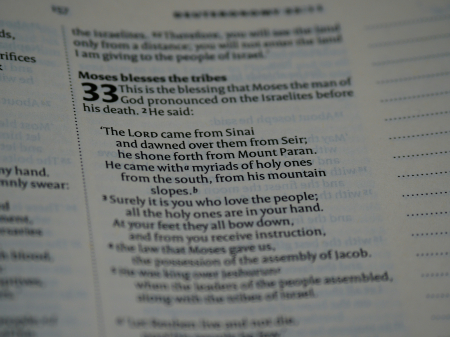 Hi readers, it seems you use Catholic Online a lot; that's great! It's a little awkward to ask, but we need your help. If you have already donated, we sincerely thank you. We're not salespeople, but we depend on donations averaging $14.76 and fewer than 1% of readers give. If you donate just $5.00, the price of your coffee, Catholic Online School could keep thriving. Thank you. Help Now >
Hi readers, it seems you use Catholic Online a lot; that's great! It's a little awkward to ask, but we need your help. If you have already donated, we sincerely thank you. We're not salespeople, but we depend on donations averaging $14.76 and fewer than 1% of readers give. If you donate just $5.00, the price of your coffee, Catholic Online School could keep thriving. Thank you. Help Now >
Rest in God with the Gifts of the Holy Spirit
FREE Catholic Classes
It is our destiny to rest in God for eternity. This means that we were made for God and to be in relationship with Him. The gifts of the Holy Spirit help facilitate this relationship. When we learn about the seven gifts of the Holy Spirit and the charismatic gifts, and we are open to them, and we use them for love of God and neighbor, we will grow closer to Him and find rest in Him.
Highlights
Catholic Online (https://www.catholic.org)
6/13/2011 (1 decade ago)
Published in Living Faith
Keywords: Holy Spirit, Pentecost, Gifts of the Holy Spirit, Seven gifts, Charismatic gifts, Michael Terheyden
P>KNOXVILLE, TN (Catholic Online) - It is our destiny to rest in God for eternity. This means that we were made for God and to be in relationship with Him. The gifts of the Holy Spirit help facilitate this relationship. The connection between the gifts and this relationship lies in the virtues.
According to the Catechism of the Catholic Church, the virtues help us live in accordance with reason and faith (1834), and they dispose us to live in a relationship with the Holy Trinity (1840). The gifts of the Holy Spirit, complete and perfect the virtues (1831). Thus, the gifts help lead us to our destiny. So if you want a deeper relationship with God, learning about the gifts of the Holy Spirit and using them will help.
There are two main categories of gifts. The first category includes the seven gifts which are found in Isaiah 11:2-3. They are fear, piety, fortitude, knowledge, understanding, counsel, and wisdom. The primary function of these seven gifts is to purify us and make us docile to the prompting of the Holy Spirit. When the Catechism speaks about the gifts completing and perfecting the virtues, it is referring to these specific gifts.
Unfortunately, these seven gifts are sometimes poorly understood or utilized. Father Matthias Scheeben's book, The Glories of Divine Grace, and the "Novena to the Holy Spirit" published in The Catholic Family Book of Novenas provide some helpful information about these gifts.
The gift of fear perfects the virtue of temperance. This gift fills us with awe and reverence for God. It makes us dread the thought of displeasing God because of our love for Him. A right-ordered and healthy fear of God is the beginning of wisdom.
The gift of piety perfects the virtue of justice, and it fills us with a loving affection for God as our father. It inspires us to respect and love all persons and things for God's sake. Piety transforms religious practices and worship into joyful service to God.
The gift of fortitude perfects the natural virtue of fortitude, and it strengthens us against our natural fears. It enables us to persevere when we are confronted with difficulty or danger. Fortitude provides us with the energy and resolve to endure even lifelong tribulation.
The gift of knowledge perfects the virtue of hope, and it reveals the emptiness of created things in themselves. It enables us to see them for what they are and place them in proper relation to God. Knowing the true value or worth of created things enables us to use them for their true purpose.
The gift of understanding perfects the virtue of faith. Understanding helps us grasp the truths of our faith, especially revealed truth. It enables us to penetrate the deep layers of truth and discover rich meaning in our faith. Understanding inspires sterile, inactive faith and transforms it into a powerful testimony.
The gift of counsel perfects the virtue of prudence. Counsel is like supernatural common sense. It helps us to make proper judgments. Counsel enables us to apply the gifts of knowledge and understanding in the actual circumstances that confront us in our daily life.
The gift of wisdom perfects the virtue of love, and it embodies all the other gifts. It is the highest and most perfect of the seven gifts. It enlightens the mind and directs it to that which is eternal, transcendent, and divine--God. Wisdom strengthens faith, fortifies hope, and perfects charity.
The second category is the charismatic gifts. While the first category of gifts is more concerned with the individual's sanctification, this category is more focused on building up the Body of Christ. The charismatic gifts are subdivided into two groups--the ordinary and the extraordinary. When we think of these gifts, we usually think of the latter, the extraordinary. The gifts belonging to this group entail miraculous power. We are most familiar with them from the writings of Saint Paul, especially 1 Corinthians, chapter 12.
Some of the extraordinary gifts are wisdom (not to be confused with wisdom above), faith, healing, mighty deeds, prophecy, discerning spirits, the gift of tongues, and interpretation. The gift of wisdom enables one to teach about higher mysteries. The gifts of faith, healing and mighty deeds support the teaching gifts. The gifts of prophecy, discerning spirits, speaking in tongues, and interpretation are used to enlighten and exhort the faithful and confound unbelievers. When we think of the charismatic gifts, we generally think of the extraordinary gifts, but the ordinary charismatic gifts are also important.
Unlike the extraordinary gifts, we have received the ordinary gifts in abundance. They are a part of our everyday life. The ordinary gifts are more concerned with temporal affairs. For instance, in 1 Corinthians, chapter 12, Saint Paul mentions the gift of knowledge, which enables one to teach about the truths of the faith, and the gifts of assistance and administration. These last two are concerned with works of charity and governance. In the most generalized sense, the ordinary gifts might include all gifts that help us fulfill our state in life: intelligence, good health, good parenting, and many other skills and abilities that we have.
So how do we know which gifts we have? It depends on which gifts we are talking about. We have all been given a share in each of the seven gifts mentioned above. We received them when we were baptized, and they were strengthened by the sacrament of Confirmation. But they may not be felt immediately. They may lie dormant for years. A major factor involved in the timing has to do with how well we have prepared our soul. This is one reason why a devout prayer life is so important. The more we pray, the more we are open to God's graces. If we want these gifts to manifest themselves in our lives, then we need to pray always and remain in a state of grace.
If we are talking about the extraordinary charismatic gifts, it is a different matter. Not everyone receives these gifts. During the Apostolic Age, the extraordinary gifts were quite common, and they helped the early Church grow and persevere during waves of persecutions. But they have not been very common since that time, though some believe we may be approaching a time when the extraordinary gifts will become more prevalent. These gifts are also different in the sense that God gives them to saint and sinner alike. There is nothing we can do to acquire them. All we can do is be aware that they are real and be open to them. If we think that we may have an extraordinary gift, it is best to seek the council of a holy priest who knows about the charismatic gifts.
On the other hand, in some ways it is the reverse regarding the ordinary charismatic gifts. They may not appear miraculous, but we have been given these gifts in abundance. Each of us has received different and often multiple ordinary gifts. However, for many of us, it seems like one or two are usually dominant. Do you know your dominant gifts? If not, you may be able to discern them by looking at your passions, desires, interests, abilities, circumstances, and opportunities. One of my favorite quotes is by Saint Teresa of Avila. She says, "Do whatever most kindles love in you." Love can help reveal our ordinary charismatic gifts. It can also help reveal the path that leads to our ultimate destiny.
We can sum up all of the above as follows: when we learn about the seven gifts of the Holy Spirit and the charismatic gifts, and we are open to them, and we use them for love of God and neighbor, we will begin to relate to God in a more meaningful way and grow closer to Him. As we can see, the gifts of the Holy Spirit are an indispensable aid on the journey toward our destiny and eternal rest in God.
-----
Michael Terheyden was born into a Catholic family, but that is not why he is a Catholic. He is a Catholic because he believes that truth is real, that it is beautiful and good, and that the fullness of truth is in the Catholic Church. However, he knows that God's grace operating throughout his life is the main reason he is a Catholic. He is greatly blessed to share his faith and his life with his beautiful wife, Dorothy. They have four grown children and three grandchildren.
---
'Help Give every Student and Teacher FREE resources for a world-class Moral Catholic Education'
Copyright 2021 - Distributed by Catholic Online
Join the Movement
When you sign up below, you don't just join an email list - you're joining an entire movement for Free world class Catholic education.
-

-
Mysteries of the Rosary
-
St. Faustina Kowalska
-
Litany of the Blessed Virgin Mary
-
Saint of the Day for Wednesday, Oct 4th, 2023
-
Popular Saints
-
St. Francis of Assisi
-
Bible
-
Female / Women Saints
-
7 Morning Prayers you need to get your day started with God
-
Litany of the Blessed Virgin Mary
Daily Catholic
 Daily Readings for Wednesday, July 03, 2024
Daily Readings for Wednesday, July 03, 2024 St. Thomas: Saint of the Day for Wednesday, July 03, 2024
St. Thomas: Saint of the Day for Wednesday, July 03, 2024 A Prayer of Gratitude for God's Blessings - Acts of Thomas: Prayer of the Day for Wednesday, July 03, 2024
A Prayer of Gratitude for God's Blessings - Acts of Thomas: Prayer of the Day for Wednesday, July 03, 2024- Daily Readings for Tuesday, July 02, 2024
- St. Bernardino Realino: Saint of the Day for Tuesday, July 02, 2024
- Prayer for Employment: Prayer of the Day for Tuesday, July 02, 2024
![]()
Copyright 2024 Catholic Online. All materials contained on this site, whether written, audible or visual are the exclusive property of Catholic Online and are protected under U.S. and International copyright laws, © Copyright 2024 Catholic Online. Any unauthorized use, without prior written consent of Catholic Online is strictly forbidden and prohibited.
Catholic Online is a Project of Your Catholic Voice Foundation, a Not-for-Profit Corporation. Your Catholic Voice Foundation has been granted a recognition of tax exemption under Section 501(c)(3) of the Internal Revenue Code. Federal Tax Identification Number: 81-0596847. Your gift is tax-deductible as allowed by law.










 Daily Readings for Wednesday, July 03, 2024
Daily Readings for Wednesday, July 03, 2024 St. Thomas: Saint of the Day for Wednesday, July 03, 2024
St. Thomas: Saint of the Day for Wednesday, July 03, 2024 A Prayer of Gratitude for God's Blessings - Acts of Thomas: Prayer of the Day for Wednesday, July 03, 2024
A Prayer of Gratitude for God's Blessings - Acts of Thomas: Prayer of the Day for Wednesday, July 03, 2024

